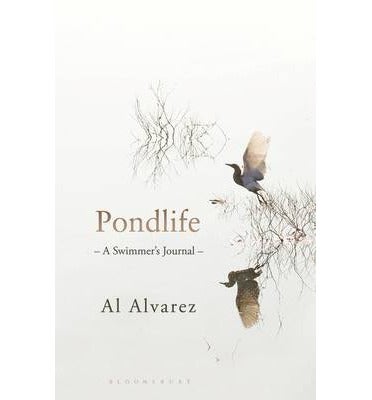Pondlife: A Swimmer’s Journal, By Al Alvarez
A swimmer’s journal that charts the emotional ripples beneath daily life

Despite its title, Pondlife is not in the end a book about either swimming or London wildlife; although it is full of warmly realised descriptions of both. Poet and critic Al Alvarez has been swimming in the Hampstead ponds since he was three. In his sixties, forced by an old injury to abandon a serious climbing habit, he began going there daily for his exercise fix. In his seventies he started keeping a journal of those visits.
The journal covers the years 2002 to 2011, and was always intended for publication. Alvarez refers to this project periodically, sometimes complaining that he’s finding the book difficult to write. Yet what he has written feels intimate and authentic. Pondlife never slips into self-conscious fine writing. And, insofar as it is a memoir, there seems to be little window-dressing.
Later entries portray the frustrations and indignities of age with uncompromising straightforwardness. By the time we read that, “I’m trapped in and by this foolish, failing wreck of a body and can’t get loose or see beyond it”, we have followed and understood every step in the escalation of difficulties and losses that warrants this protest. For Alvarez helps us to understand ageing in a way that few writers have. In making it daily and incremental, he renders it recognisable. At times, reading this book is like wearing one of those weighted vests designed to show you what pregnancy, or age, is really like. In 2003, “I turned my ankle within moments of walking onto the Heath and thereafter the wretched thing became the centre of my attention”; by 2006, “when I got up for a pee in the middle of the night neither leg seemed to be working properly”.
Alvarez himself refers to this as a “book on old age”. It is a subtle, careful portrait of what age does, and as such should be required reading for anyone who is engaged with older people and with ageing: so that’s all of us. But this lucid and moving journal is about more than just one thing. It is also a study of writing, and a portrait of a particular kind of Hampstead life; it deals with the natural world and even the poker-playing for which Alvarez is legendary.
Uniting these apparently disparate elements is the life well lived. As the author says, “This is the land of the living. Pure delight.” Part of this particular well-lived life is its literary distinction. As Alvarez struggles with deadlines and attends literary functions, his judgements can be hilariously sharp, but the portrait of pragmatic hard work that emerges would be useful reading for many a tyro.
Such a life has its rewards: the house in Italy, and the roster of interesting friends (though I would have placed the glossary that identifies them more discreetly at the back of the book). But, as philosophers down the ages have pointed out, the good life is an internal rather than an external state of affairs. The repetitive journal form, and Alvarez’s regular swims, are most akin to meditation. Anyone with a similar experience of daily outdoor exercise – running the dog across fields, suburban jogging – will recognise the sense of deepened intimacy with place and the natural world that he notes with a light, but accurate, touch.
Pondlife is full of gulls, swans and heron as well as, occasionally, “A lop-sided moon stranded in all this brightness”. There are near-daily records of water temperature and distances swum, functional details which provide quiet verisimilitude. Yet the book’s vivid sense of lived reality owes itself to Alvarez’s gift for looking outward, beyond the psyche and its obsessions. His writing is filled with attention and enthusiasm. Viewed on a sunny March day, “The whole city is shining. The promised land.” The reader has an uncanny sense of being inside the writer’s experience and sharing it, even of looking out through his eyes.
It’s this exceptional evocation of complicity that makes the passages about physical frailty so moving. We’ve learnt what it feels like to be the ghost trapped in a failing machine.
Subscribe to Independent Premium to bookmark this article
Want to bookmark your favourite articles and stories to read or reference later? Start your Independent Premium subscription today.

Join our commenting forum
Join thought-provoking conversations, follow other Independent readers and see their replies